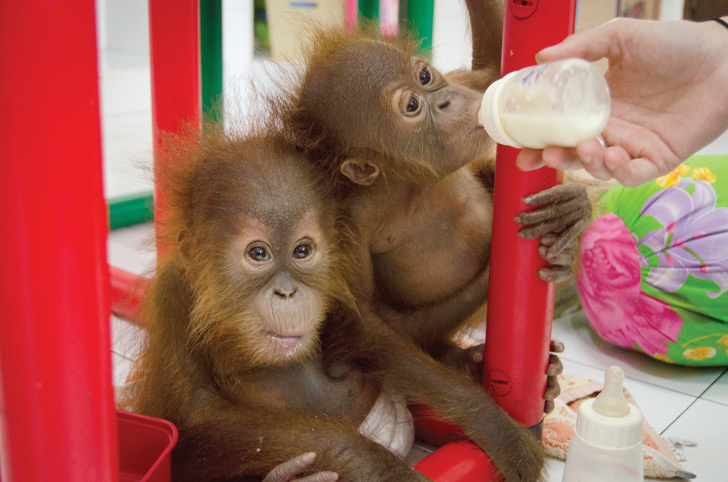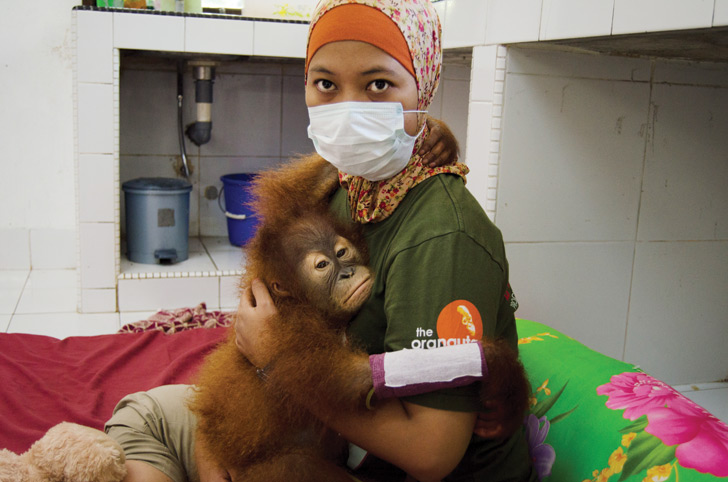The latest arrivals at the orangutan quarantine centre were three infants intended for market, before police plucked them from a trader’s crashed car. Traumatised, with the odd shotgun pellet embedded under skin or in bone, these childlike apes appeared last month at the centre near Medan, the North Sumatran provincial capital, wearing nappies, cuddling teddies and being bottle-fed by their human carers.
Local farmers acting to protect their crops from wandering apes likely attacked the mothers, according to Jess McKelson, quarantine overseer at the Sumatran Orangutan Conservation Programme (SOCP). Infant orangutans are prised from maternal corpses and sold for cash; the illegal wildlife trade is a byproduct of deforestation.
Fewer than 7,000 Sumatran orangutans are left in the world, and many are refugees from the vanishing Leuser Ecosystem. Despite being protected by Indonesian law, the 2.6 million-hectare tropical rainforest is under threat from development. As their habitat is eroded and orangutans are forced into human territory, the lucky find their way to the quarantine centre, which works to eventually return them to the wild. The unlucky are killed by impoverished villagers or kept as pets.
Trading, owning or transporting orangutans has been illegal in Indonesia since 1990. But there have only been two convictions in Sumatra for these crimes, which means “villagers don’t give a toss about protection laws”, said Orangutan Information Centre (OIC) founding director Panut Hadisiswoyo. “There’s no pride for orangutans nor understanding of their value in Sumatra.”
Abdul Pasaribu, 20, the son of a farmer in neighbouring Aceh province, said that, for villagers, it was a matter of survival. “We care about protecting our livelihood,” he said. “Why would my parents put an animal ahead of their crops?”
Veterinarian Ricko Jaya, who heads the Human Orangutan Conflict Response Unit (HOCRU), has “repeatedly” seen apes with their noses sliced off by machetes or harbouring stab wounds dripping with maggots. In November, he treated a male whose body had been riddled with bullets and whose eyes had both been shot out. Unfortunately, the orangutan didn’t survive.
The HOCRU are on call around the clock and have had some success in reducing lethal confrontations between humans and apes. Jaya said that in recent months farmers have started to call his team before taking action themselves. “It’s not that they care about the animal’s welfare, we just have a reputation for removing orangutans very efficiently,” he explained.
Officially, it is the job of the police to confiscate and rescue orangutans held illegally in captivity, but the authorities, according to Hadisiswoyo, initiate virtually no raids. The country’s pervasive corruption makes confiscating pets from well-connected owners – often working for the military or local government themselves – a difficult task. “Of course they’re aware of the law,” he said, “in fact they use it [a pet orangutan] to show people they’re above the law.”
As a result, Hadisiswoyo has to think outside the box, creating situations that leave the authorities without any wriggle room. “We’d heard there was an orangutan hidden in an amusement park owned by this notorious Medan gangster, but the police put up so much resistance to even checking the place… somehow we had to get an absolute guarantee it was still there.”

So Hadisiswoyo hired a “pretty lady” to flirt with the security staff. Her job was to cajole information from them about the orangutan’s whereabouts then text the details to OIC staff. The animal was rescued that night.
While most pets are liberated from dire living conditions – some are kept on short chains in the sun for years, many of them carrying diseases and malnourished – there can also be cases involving genuine affection.
Suherry Aprianto, an engineer with OIC who has assisted in several confiscations, recalled a traumatic separation from an elderly woman who treated her pet orangutan as if it were a child. It lived on Pepsi and noodles, wore dresses and she even shaved its arms. “Of course this is very unhealthy and unnatural for an orangutan, but it was clear she loved it,” he said.
Welfare organisations such as OIC do not believe the average Indonesian will see their arboreal cousin as more than a pest or pet any time soon. But humans are feeling the environmental effects of deforestation for palm oil plantations as well, so conservationists are working hard to ensure people associate orangutans with a healthy forest.
“We have to speak their [villagers’] language. I try to show that saving the orangutan is really saving people. Both species are dependent on trees – lose the forest, lose oxygen, lose water, lose lives,” says Hadisiswoyo.
The annual haze is the most visible problem. Caused by forest fires lit to clear peatland for palm oil plantations, it triggers health issues for people across the region. But thirsty palm trees affect water tables too, by drying up rivers and forcing villages to purchase water.

“We care about protecting our livelihood,” he said. “Why would my parents put an animal ahead of their crops?”
Abdul Pasaribu, farmer
Palm oil cultivation is an enticing option for anyone with suitable land or the means to obtain it. Global demand appears insatiable – the product is found in everything from biodiesel to ice cream. Plus, the plants are very low maintenance, can be harvested every two weeks, and yield at least three times as much oil per hectare as coconuts or sunflowers.
Hadisiswoyo said he could never ask Sumatrans to abandon palm oil. “I cannot deny it gives them a good livelihood,” he said. “Our mission is not to boycott palm oil, but to boycott its expansion into the rainforest and reclaim areas where it’s illegally encroached the national park.”
He has set up community groups with the aim of educating villagers about the value of forest. “Not only in terms of its ecological services, but for study, for eco-tourism, and as Indonesian heritage,” Hadisiswoyo said. But it is not only small-scale palm oil cultivation that is problematic – industrial-sized plantations are also threatening the rainforest’s survival.
The 800,000-hectare Gunung Leuser National Park is the last stronghold for orangutans, as well as critically endangered tigers, rhinos and elephants. Protecting its boundaries from encroachment involves a lot of finger-pointing amongst the convoluted web of stakeholders. Conservation groups complain they are doing the authorities’ work – patrolling forest borders, pushing cases through courts and reforesting areas seized from illegal plantations – without any government funding.
Gunung Leuser National Park director Andi Busrul said the park is understaffed and underfunded by the central government. “Even though encroachment is getting worse, our budget was cut this year. But last year it wasn’t enough to carry out the minimum protection measures,” he explained.
One national park official, speaking on condition of anonymity, told Southeast Asia Globe that corrupt policemen and bupatis (leaders of the 100-plus regencies surrounding the park) are the biggest hurdles to protecting Gunung Leuser’s borders.
He said some police take bribes from the mafia to turn a blind eye to slash-and-burn clearing of forests. Reporting turncoats can backfire. “It’s vital we maintain a good relationship with the police,” he said. “Criticising one can turn the whole force against us.”
“Villagers don’t give a toss about protection laws”
Panut Hadisiswoyo, OIC

He described bupatis as notorious double dealers. Typically, residents of a regency want more space to grow more crops, so promises to secure land is an easy way for a bupati to gain votes. “He must also promise the provincial government to safeguard that same land… but his job’s more dependent on the regency, so they get their land in the end.”
Indonesia’s government is focused on bringing infrastructure to the region, with a major roads-building programme. Busral says the roads can help conservation efforts by making transport to markets cheaper and faster, so villagers will not require more land to earn a decent living, thus limiting the temptation to encroach on the national park.
But conservation groups lambast the new roads connecting remote villages. SOCP director Ian Singleton maintains that building roads through the forest is a death sentence for orangutan populations. Since the apes live almost exclusively in trees, a road is a barrier “screwing up their roaming patterns, their access to food sources and their capacity to breed”.
The Sumatran orangutan clearly has human friends as well as enemies. Organisations such as OIC and SOCP are expanding their capacity to help the refugees. As Hadisiswoyo said: “As long as their habitat is being destroyed, they will enter ours – and the trade, the conflict and the killing will happen.”


